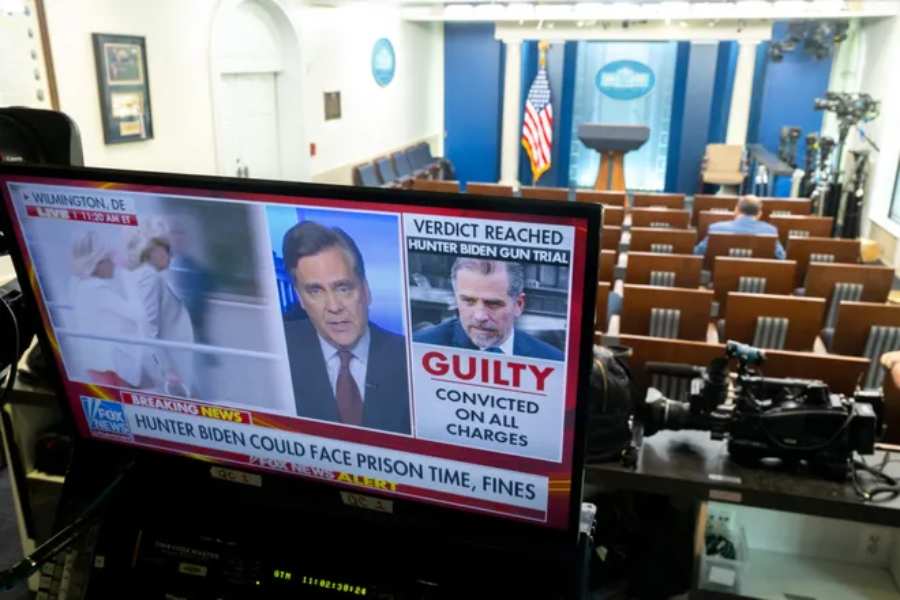WASHINGTON — President Donald Trump has revoked Secret Service protection for Hunter Biden and Ashley Biden, calling the security arrangements an unnecessary financial burden on taxpayers. The decision, announced Monday on Truth Social, has stirred political debate over presidential security protocols and potential political motivations.
Trump expressed frustration over the size of the security detail assigned to President Joe Biden’s two adult children, claiming that Hunter Biden, 55, had an 18-person security team, while Ashley Biden, 43, had 13 agents protecting her.
“Hunter Biden has had Secret Service protection for an extended period, all paid for by the United States taxpayer,” Trump wrote. “There are as many as 18 people on this Detail, which is ridiculous! Likewise, Ashley Biden, who has 13 agents, will be taken off the list.”
The revocation took effect immediately, with security withdrawn within hours of Trump’s post. The decision comes after reports surfaced that Hunter Biden was vacationing in South Africa, prompting speculation over why taxpayer dollars were being used for his protection abroad.
During an appearance at the Kennedy Center on Monday, Trump was asked about Hunter Biden’s security detail in South Africa. Initially, he claimed he was unaware of the situation but vowed to “take a look at it.” By the evening, both Hunter and Ashley Biden had lost their protection.
Under federal law, Secret Service protection is guaranteed for former presidents and their spouses for life (unless the spouse remarries). However, children of former presidents are only entitled to protection until the age of 16. Any extension beyond that point is granted at the discretion of the sitting president.
While many adult children of former presidents voluntarily relinquish their security details, Hunter and Ashley Biden retained theirs during their father’s administration. Trump’s move to cut them off abruptly represents a significant break from standard practice.
The revocation of Secret Service protection comes just months after President Biden issued a controversial pardon for Hunter Biden. The December 2024 pardon cleared Hunter of three federal gun felony convictions and federal tax charges, a decision that Republicans heavily criticized.
At the time, President Biden defended his decision, arguing that his son had been “selectively and unfairly prosecuted.” Trump, however, used the situation to attack Hunter Biden, questioning his travels and character.
Trump specifically targeted Hunter Biden’s vacation in South Africa, questioning why American taxpayers were footing the bill for his security in a country that Trump himself sanctioned last month.
“Of all places, South Africa—a place where the human rights of people have been strenuously questioned,” Trump wrote on Truth Social.
Trump’s comments align with a recent executive order halting U.S. aid to South Africa, citing alleged human rights abuses. His administration has condemned the country’s land reform policies, which some claim disproportionately impact white landowners.
The debate over South Africa’s land redistribution laws has been a talking point among conservatives, including billionaire Elon Musk, who was born in South Africa. Musk has publicly criticized South Africa’s land laws, calling them “openly racist ownership laws.”
Hunter Biden’s wife, Melissa Cohen Biden, is a South African native, further intertwining the political controversy with personal family ties.
Trump has previously revoked Secret Service protection for individuals who had previously been granted it. On his first day in office, he stripped security protections from John Bolton, his former National Security Adviser, and other high-profile officials from prior administrations.
While it is not uncommon for security details to be reevaluated under a new administration, Trump’s immediate and public revocation of protection for Hunter and Ashley Biden is highly unusual. Typically, decisions regarding Secret Service assignments are carefully reviewed and handled behind closed doors.
Trump’s decision has ignited political controversy, with Democratic lawmakers and security experts raising concerns over the sudden withdrawal of protection. Some argue that Hunter Biden’s recent legal troubles and public scrutiny make him a potential security risk, and revoking his details could leave him vulnerable.
Republicans, on the other hand, have largely supported the move, arguing that Hunter Biden’s past criminal charges make him undeserving of taxpayer-funded protection. Conservative commentators have framed Trump’s decision as an effort to reduce government waste.
Regardless of political affiliation, Trump’s decision sets a new precedent for Secret Service protection policies. The question of who deserves security, and at what cost, remains a heated issue in Washington as the Biden family and political leaders respond to Trump’s latest move.


